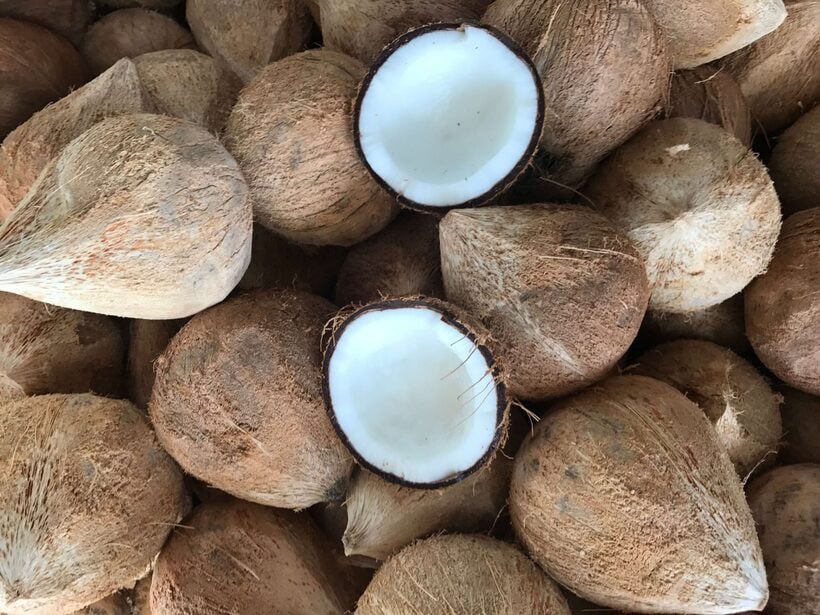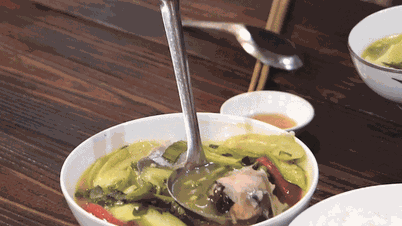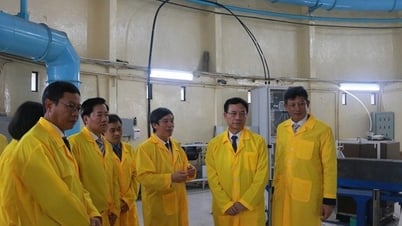Processed coconut imports increase
Despite being a large production region, Vietnam still grows strongly. coconut import processed, leading the growth rate in the fruit group in the first 4 months of 2025. Specifically, according to a report by the Vietnam Fruit and Vegetable Association, in the first 4 months of the year, Vietnam spent 7.2 million USD to import processed coconut, an increase of 11.3 times over the same period last year.

Talking to reporters of Cong Thuong Newspaper, Mr. Cao Ba Dang Khoa - Vice President and General Secretary of Vietnam Coconut Association - said that in recent times, Raw coconut industry Vietnam's products are 'bleeding' to the markets of Cambodia, Thailand and China.
The reason is that, from February to April 2025, raw coconut exports to Thailand increased sharply. Thailand is converting its crop from raw coconut to drinking coconut. Therefore, they increased their import of raw coconut from Vietnam via Cambodia. In addition, Chinese enterprises also increased their raw processing, preliminary processing, and freezing, so they also increased their import of raw coconut.
Domestic coconut processing factories have to limit production. The imbalance of raw materials forces domestic processing enterprises to increase imports from Indonesia.
However, this import is only temporary because Indonesia is in the process of applying an 80% coconut export tax to protect domestic raw materials and call for investment in the processing industry here.
According to Mr. Cao Ba Dang Khoa, compared to the same period last year, the price of raw coconut increased by 500 - 600%. As for fresh coconut, due to the media effect of exporting to the Chinese and US markets, the price of fresh coconut in the country also increased by 200-250% compared to the same period last year.
Vietnam's coconut processing industry confident to compete with Thai coconut
The country currently has more than 850 manufacturing and processing enterprises with more than 100 products and more than 200 types of food using raw materials from coconut trees. Notably, many of these enterprises have carried out deep processing, making Vietnam the 4th largest exporter of coconut products in the Asia- Pacific region.
Dried coconut accounts for a large proportion of total export turnover (about 74%). In recent years, Vietnam's coconut processing industry has also entered a new phase as the processing industry has been upgraded.
As one of the coconut processing and exporting enterprises, Mr. Tran Van Duc - Chairman of the Board of Directors and General Director of Beinco - said that the company's processed coconut products have been exported to more than 43 markets. In particular, Beinco's exclusive brand "Delta Coco" is present in America, Europe, the Middle East... and is currently trading on e-commerce platforms both domestically and internationally.
According to Mr. Tran Van Duc, in the past, Thailand was the main supplier of processed coconut products to the EU and US markets. However, currently, many importers in demanding markets are switching to Vietnam because Vietnamese coconuts are delicious and the processing industry is modern and on par with the world .
Regarding this, Mr. Cao Ba Dang Khoa said that currently, raw coconut is processed into more than 100 products by factories, of which more than 60 products are exported. We have built the brand of the Vietnamese coconut industry in the world market.
"Vietnam's processed coconut industry can compete fairly with Thailand's processed coconut industry," said Mr. Cao Ba Dang Khoa, adding that the main markets for Thai processed coconut are mainly China and the Middle East, while the main markets for Vietnamese processed coconut are the US and EU.
In 2024, Vietnam's export turnover of coconut and coconut products will reach nearly 1.1 billion USD, of which fresh coconut will contribute 390 million USD. Although many positive signals have been recorded, according to Mr. Cao Ba Dang Khoa, due to the high increase in raw material prices, the export growth target set for the coconut industry in 2025 is forecasted to not be achieved.
“In 2025, we set an export growth target of about 20%, but due to the recent shortage of raw materials in factories, some factories have stopped operating or are operating at a low level, so the export turnover is forecast to grow by about 15%,” said Mr. Cao Ba Dang Khoa.
Vietnam has about 200,000 hectares of coconut plantations, with an estimated output of 2 million tons per year. One-third of the area meets organic standards as required by the US and EU. The Mekong Delta is the largest coconut growing region in the country, accounting for 88% of the area. The domestic coconut industry has great potential, not only supplying raw materials but also participating in the carbon credit market.
Coconut products are all valued many times higher than raw exports. For example, desiccated coconut has an export value 5 times higher than that of coconuts. Meanwhile, coconut milk powder is 4 times more valuable, coconut milk and coconut cream are 2 times more valuable than desiccated coconut. Pure coconut oil is also 10 times more valuable than raw coconut oil...
However, in recent years, dried coconut raw materials have been exported with a 0% tax rate, so many businesses have set up primary processing facilities and then shipped them to China for deep processing. The Vietnamese coconut processing industry is facing a serious risk of raw material shortage.
According to Decision 431/2024/QD-BNN-TT of the Ministry of Agriculture and Rural Development (now the Ministry of Agriculture and Environment ), the target by 2030 is to maintain a stable coconut area of 200,000 hectares. This figure has been achieved so far.
However, for the sustainable development of the coconut industry, experts say that, in addition to the coconut development project until 2030 approved by the Prime Minister, provinces need to have their own development projects for the coconut industry in each locality. In particular, this project must be placed in the overall supply-demand equation, ensuring a balance between the production capacity of raw coconuts and the processing and consumption capacity of the market. In the long term, deep processing is still the direction to help the coconut industry develop sustainably.
Source: https://baoquangninh.vn/nhap-khau-dua-che-bien-tang-11-3-lan-3363063.html



































































































Comment (0)